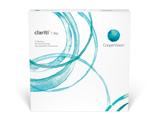
Is your child asking about contacts and maybe even stubbornly refusing to wear her glasses? Clearly she thinks she’s ready, but when is the “right” age to get contacts for children? Although studies indicate that children as young as 8 years old are capable of wearing contacts, it’s important to consider your individual child and his or her level of maturity and responsibility. .
Is your child ready?
If you’re wondering if your child is ready for the upkeep of contacts, just look to how she handles her other responsibilities. Does he do his homework without argument? Is she able to keep her things tidy and clean? For more questions to help decide if your child is ready, read, “The “right” age to wear contact lenses.”The best way to be confident in your decision whether or not to get contacts for your child is to talk with your eye care professional. If you don’t have one, our Find an eye doctor tool can help you find one.
Daily Disposables
It wasn’t so long ago when eye doctors wouldn’t prescribe contact lenses to children under the age of 13 or 14. So what changed? The answer is daily disposables. Three in ten doctors who are likely to fit children with contact lenses attribute their change in fitting behavior to daily disposable contact lenses, according to the American Optometric Association (AOA). Because they require so little maintenance and get thrown away at the end of each day, it makes caring for lenses easy even for a young child. A great option are Proclear 1 day contact lenses.
Far-reaching Benefits
If you’re still on the fence as to whether contacts are a good choice for your child, consider the findings of The Adolescent and Child Health Initiative to Encourage Vision Empowerment (ACHIEVE) study which investigated the psychological effect wearing contact lenses had on children over a period of three years. The findings indicated contact lenses greatly enhance a young person’s self esteem. It specifically reported an improvement in their physical appearance, acceptance among friends, athletic ability, and even academic performance.





